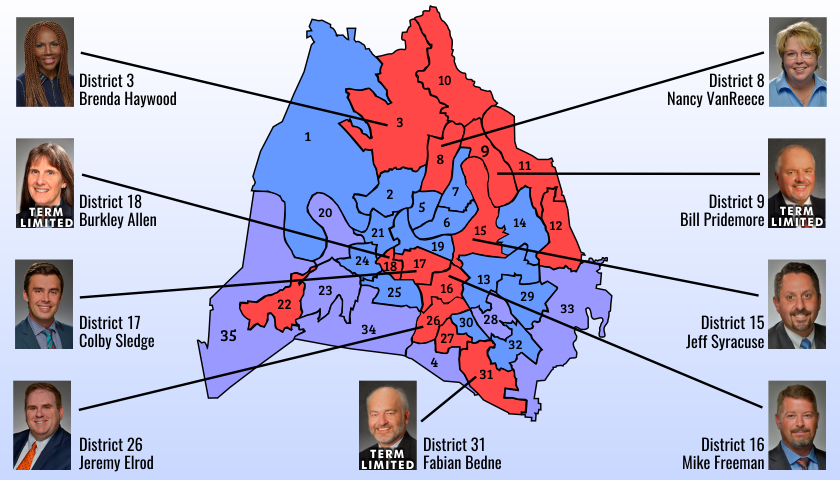Eleven members of the Metro Nashville Council who voted “yes” on the second reading of the sanctuary city ordinance on June 20 are in re-election jeopardy for 2019 because they are in favor of a policy that many of their constituents oppose, according to the results of a recent Tennessee Star Poll.
Five are at-large members, and six represent districts in which their constituents opposed the now withdrawn sanctuary city ordinance by a significant margin.
As The Star reported last week, the poll, conducted between June 28 and June 29, found that likely voters in Nashville were evenly divided over the proposed sanctuary ordinance, not in “overwhelming support,” as one of the co-sponsors At-Large Council Member Bob Mendes claimed:
When asked, “Metro Nashville Council was scheduled to vote on a proposal next week that would, in effect, turn Nashville into a sanctuary city where illegal immigrants are protected from arrest and deportation. Do you support or oppose the proposal for Nashville to become a sanctuary city?,” 49.4 percent supported, while 47.1 percent opposed, a statistical tie since the 2.3 percent differential is within the poll’s 4.2 percent margin of error.
Though the poll found that voters were in a statistical tie over the merits of the proposed ordinance, intensity of opposition was far greater than intensity of support.
“Thirty-eight and a half percent of Nashville likely voters strongly oppose the withdrawn sanctuary city ordinance, while only 31.9 percent strongly support it. The 6.6 percent differential is beyond the poll’s 4.2 percent margin of error,” The Star reported.
“The intensity of opinion against the sanctuary city plan compared to the somewhat soft support for the plan definitely makes a “yes” vote problematic for most council members. But those who voted for the plan with voters in their district overwhelmingly opposing it are at particular risk in the next election,” media consultant and political analyst Steve Gill tells The Star.
This places all five of the at-large members who voted yes and are not term-limited from running for re-election–Cooper, Gilmore, Hurt, Mendes, and Shulman– in re-election jeopardy.
Gilmore, who was elected to represent District 19 in 2007 and re-elected to that seat in 2011, was elected at-large in 2015 and is eligible to run for a second at-large term in 2019 because voters passed a charter amendment in 2008 specifying that council seats elected by district and council seats elected at large are two separate offices. The eight year term limit passed in the 1994 charter amendments, therefore, was clarified allowing a council member to serve two consecutive four-year terms elected at the district level, followed by two consecutive four year terms elected as an at-large member, and vice versa.
In addition, constituents of nine Metro Council members elected at the district level who voted yes on the ordinance disagree with their representatives on that critical issue, according to a council district by council district cross tab analysis of The Tennessee Star Poll.
Six of these nine Metro Council members elected at the district level who voted “yes” are in re-election jeopardy in 2019: Syracuse (15), Freeman (16), Elrod (26), Haywood (3), VanReece (8), and Sledge (17).
Three of the nine are term-limited out and are not eligible to run for re-election in 2019: Pridemore (9), Allen (18), and Bedne (31).
The battle to replace these three may turn on where potential replacements stand on the controversial sanctuary city issue.
“This issue is not going away, and as the numbers of illegals in Nashville continues to rise, along with the problems of crime, poverty and burden on taxpayers that accompanies that increase, those politicians who have not only failed to stop the flood but have actually encouraged it will pay a price at the ballot box,” Gill adds.
Twenty-six members of the Metro Council are eligible to run for re-election, while twelve are term limited, all of whom are elected at the district level, according to the Metro Nashville Davidson County website, which lists Metro Council members who served during the 2011-2015 term:
DISTRICT Metro Council Member
5. DAVIS, Scott
7. DAVIS, Anthony
9. PRIDEMORE, Bill
10. PARDUE, Doug
12. GLOVER, Steve
18. ALLEN, Burkley
22. WEINER, Sheri
27. BLALOCK, Davette
29. JOHNSON, Karen
30. POTTS, Jason
31. BEDNE, Fabian
32. DOWELL, Jacobia
Councilman Hagar is eligible to run for re-election in 2019, since he was elected in 2014 and served less than half a full term on the Council that served from 2011 to 2015.
Both Mayor Megan Barry and Vice Mayor David Briley are eligible to run for re-election in 2019.
The same Tennessee Star Poll showed “the sanctuary city issue could influence the outcome of the 2019 re-election bid of California-born Nashville Mayor ‘Moonbeam’ Megan Barry.”
When asked “In the next local Nashville/Davidson County election, are you more likely or less likely to vote for a mayoral candidate who supports Nashville becoming a sanctuary city,” 41.3 percent of likely Nashville/Davidson County voters said they were much less likely, while only 25.6 percent said they were much more likely.
When asked “In the next local Nashville/Davidson County election, are you more likely or less likely to vote for a City Council member who supports Nashville becoming a sanctuary city,” the results were very similar: 40.7 percent of likely Nashville/Davidson County voters said they were much less likely, while only 27.5 percent said they were much more likely.
The Tennessee Star took the cross tab analysis results of the poll even further, breaking down the poll results by each of the 35 Metro Council Districts. Since the sample size of each district was so small as to create a very high margin or error (the number of respondents in any district ranged from a low of 6 to a high of 31), we placed each Metro Council District into one of three groups, depending upon the results for that district in the cross tabs:
Districts in which there was greater than a 16 percent margin in opposition to the sanctuary city ordinance were placed in the OPPOSE group, which are shown in the headline image of this story in RED.
Districts in which there was greater than a 16 percent margin in support of the sanctuary city ordinance were placed in the FAVOR group, which are shown in the headline image of this story in BLUE.
Districts in which there was 16 percent or lower margin either in opposition to or in support of the sanctuary city ordinance were placed in the TIED group, which are shown in the headline image of this story in PURPLE.
Fourteen districts were placed in the OPPOSE group, based on the poll cross tab results: 3, 8, 9, 10, 11, 12, 15, 16, 17, 18, 22, 26, 27, and 31.
Fourteen districts were placed in the FAVOR group, based on the poll cross tab results: 1, 2, 5, 6, 7, 13, 14, 19, 21, 24, 25, 29, 30, 32.
Seven districts were placed in the TIED group, based on the poll cross tab results: 4, 20, 23, 28, 33, 34, and 35.
Sixty six percent of the 208 poll respondents who live in the 14 RED districts opposed the now-withdrawn sanctuary city ordinance, while only 31 percent supported it.
Sixty-seven percent of the 191 poll respondents who live in the 14 BLUE districts supported the now-withdrawn sanctuary city ordinance, while only 27 percent opposed it.
Fifty-two percent of the 145 poll respondents who live in the 7 PURPLE districts supported the now-withdrawn sanctuary city ordinance, while 46 percent opposed it.
While the margin of error for each of these three subsets of the overall poll is significantly greater than the poll’s 4.2 percent margin of error, the thirty plus margin differential in both the FAVOR group and the OPPOSE group is beyond the margin of error for those two groups.
One additional caveat: Due to the small sample size within each district, it is possible that some districts have been categorized in groups that do not reflect the actual voter sentiment within that district.
You can read the topline summary of The Tennessee Star Poll here:
[pdf-embedder url=”https://tennesseestar.com/wp-content/uploads/2017/07/Triton_TNStar_-NashvilleSurvey_Toplines.pdf”]






Now that I know what district I live in, I’ll remember NOT to reelect the Councilman in our district. Nashville DOES NOT need to be a sanctuary city. Our crime rate is already high enough.
[…] fact, the Tennessee Star Poll showed that as many 11 current members of the Metro Council–5 at-large members and 6 members elected by district–are at re-election risk in 2019 […]
I doubt if any of these are in trouble. Barry got elected didn’t she?!
Jim Cooper got re-elected didn’t he?
@Chris766
These aren’t liberal idiots. I have friends who are liberal idiots.
Mayor Moonbeam, her husband Scene editor Bruce Barry and their cohorts like Avi Poster, Dan Cornfield and Hedy Weinberg of the ACLU are Saul Alinskyites who call themselves “progressives” because it sounds better than socialist or Marxist. Google Saul Alinsky and see what theories of social justice they push that are now embedded deeply at Vanderbilt. Google Rules for Radicals and see their playbook.
These people are actually elitist oligarchs who join with the Babbits, like Bert Matthews, and Chamber of Commerce business interests to further their pie-in-the-sky social engineering ideals.
They think they know what is best for us the plebs, where and how we can live, who we can live with and what we should know, which includes erasing the embarrassing Civil War history of our Southern city.
What they don’t know is human nature or history. They should check out Venezuela, Cuba (oh, the Scene just ran a photo essay on Cuba), North Korea, the USSR, and other socialist paradise utopias where the middle class is squeezed into poverty, and thus, becomes beholden to the state. And inevitably, the state (or city) uses welfare for its subjects until all the wealth is gone. Think California and you get the picture.
These people DO NOT obey the law themselves so why would they make illegals? They think they can change laws when THEY want to no matter what the voters think. Vote these self righteous, people out of office. Show them they aren’t above the law.
Thank you for making your comments, I agree.
Every conservative voter must come out to vote in every election, we have them one the run on federal level, and we must keep liberals out in every state and city.
Thanks
How true , So called CONSERVATIVES STAY HOME AND COMPLAINE when the , SO called progressives take over. So called Progressives are truly (SOCIALISTS, LEFTIST, COMUNIST, LIBERALS) that use the word progressive to make their true agenda hidden . Keep it up so called Conservatives . And you will lose the cities , the states and finally the COUNTRY !!!! BY NOT VOTING AND JUST BITCHING !!!
Throw this liberal trash out of office! We believe in following the law – this trash believes in breaking the law.
Get these liberal idiots out of those positions. They think they are above the law and have zero respect for this state or its own people.